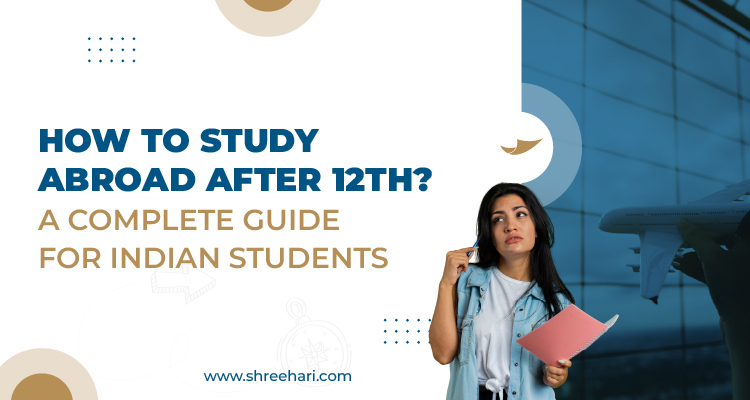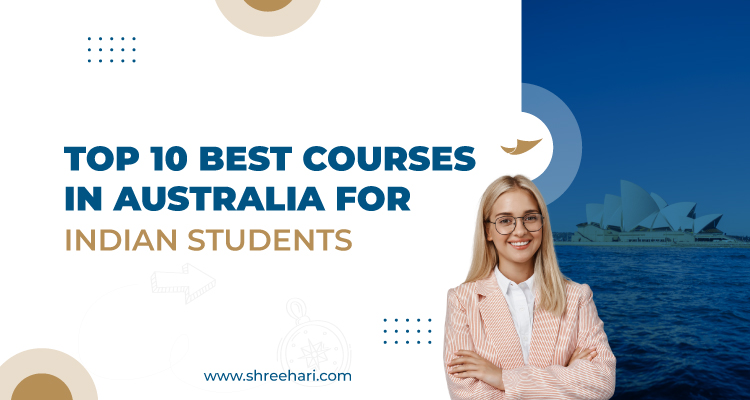
Study in the UK for Indian Students in 2025
March 7, 2025
Study in UK 2025: Attend Rajkot’s Biggest UK Education Fair’25 in Rajkot!
April 4, 2025Are you looking at the recent trends of Indian students pursuing education abroad, it can be seen that these numbers are at an all-time high. As per the data, more than 1.3 million Indian students chose to study abroad and got enrolled in foreign institutes in the year 2024. This shows that the popularity of studying abroad is on the rise. However, with this popularity, students are often perplexed with the decision of whether to move abroad for higher education after their schooling or after graduation.
For Indian students, studying abroad after completing the 12th grade is an exciting option, but it’s a life-altering choice that requires careful consideration. Studying overseas after high school exposes students to different cultures, expands their horizons academically and professionally, and fosters personal development. But organizing this trip calls for a calculated strategy. Every stage is essential to realizing your dream, from selecting the best country and program to preparing financially and applying for a visa.
This blog’s goal is to give Indian students who want to pursue Study Abroad After 12th a thorough road map that covers all the important details of the journey, such as the advantages, top destinations, in-demand courses, and cost factors. By the end of this guide, you’ll have a clear understanding of how to navigate the study abroad process and make the best decision for your future.
Why Study Abroad After 12th?
Studying abroad after the 12th offers several benefits:
Quality Education
Top universities abroad offer world-class education, research facilities, and modern teaching techniques that provide students with practical knowledge and skills.
Better Career Opportunities
A degree from a reputed foreign university increases job prospects globally. Many multinational companies prefer graduates with international exposure.
Global Exposure
Living and studying in a foreign country helps students develop a broader perspective, improve communication skills, and adapt to diverse cultures.
Advanced Research Opportunities
For students interested in research and innovation, studying abroad provides access to state-of-the-art laboratories, funding opportunities, and expert mentors.
Post-Study Work Opportunities
Many countries offer work permits after graduation, allowing students to gain international work experience and earn a high salary.
Comparing Study Abroad After 12th vs. After Graduation
| Criteria | Study Abroad After 12th | Study Abroad After Graduation |
| Duration | 3-4 years for UG courses | 1-2 years for PG courses |
| Cost | Higher due to longer duration | Lower due to shorter duration |
| Flexibility | More career paths to explore | Limited to specialization |
| Post-Study Work | Depends on country | Better opportunities |
| Job Prospects | Longer time to settle in the job market | Faster employment |
While studying abroad after graduation may be a better option for those looking to save money, starting early (after 12th) helps students adapt better to international education systems and career opportunities.
Best Study Abroad Destinations for Indian Students
USA
- Home to top universities like Harvard, MIT, and Stanford.
- Offers diverse courses, scholarships, and excellent career prospects.
- Requires SAT/ACT and TOEFL/IELTS for admission.
Canada
- Affordable education with high job opportunities.
- Post-graduation work permits allow students to work after completing studies.
- Requires IELTS for English proficiency.
UK
- Renowned universities like Oxford, Cambridge, and Imperial College London.
- Shorter duration UG programs (3 years) reduce costs.
- Requires A-levels/IB scores or foundation courses for admission.
Australia
- Popular for engineering, business, and medical studies.
- Offers scholarships and post-study work permits.
- Requires IELTS or PTE for language proficiency.
New Zealand
- Affordable tuition fees and high-quality education.
- Work opportunities available during and after studies.
- IELTS is required for most universities.
Germany
- Tuition-free education in public universities for international students.
- Best for engineering, IT, and science courses.
- Requires TestAS (for aptitude) and German language proficiency for some programs.
Choosing the Right Course Based on Your Stream
For Science Students
- Engineering (Mechanical, Civil, Electrical, Computer Science)
- Medicine (MBBS, Dentistry, Pharmacy, Biotechnology)
- Information Technology (Cybersecurity, Data Science, AI)
For Commerce Students
- Business Management (BBA, Finance, Marketing)
- Accounting & Economics
- Hospitality & Tourism
For Arts Students
- Journalism & Mass Communication
- Psychology & Sociology
- Fine Arts & Fashion Design
Choosing the right course based on interest and career goals ensures long-term success in your professional journey.
Application Process: Step-by-Step Guide
- Choose Your Course & Country – Research universities based on your preferred course, budget, and career opportunities.
- Check Eligibility & Requirements – Verify academic requirements, entrance exams (SAT, IELTS, TOEFL), and other prerequisites.
- Prepare for Standardized Tests – Most universities require English proficiency tests like IELTS/TOEFL and aptitude tests like SAT/ACT.
- Apply to Universities – Submit applications online through university portals or centralized systems like UCAS (UK) or Common App (USA).
- Write a Strong SOP & LORs – Statement of Purpose (SOP) and Letters of Recommendation (LORs) play a crucial role in admissions.
- Apply for Scholarships – Research financial aid options to reduce tuition costs.
- Secure Student Visa – Apply for a student visa after receiving the admission letter.
- Plan Accommodation & Travel – Arrange housing and book travel tickets before departure.
Scholarships & Financial Aid Options
Studying abroad can be expensive, but many universities and governments offer scholarships for Indian students.
Merit-Based Scholarships
- Fulbright Scholarship (USA)
- Commonwealth Scholarship (UK)
- DAAD Scholarship (Germany)
Need-Based Scholarships
- Inlaks Shivdasani Foundation Scholarship
- Tata Scholarship for Cornell University
Government Scholarships
- National Overseas Scholarship (by Indian Government)
- MEXT Scholarship (Japan)
University-Specific Scholarships
Many universities offer their own scholarships based on academic performance and extracurricular activities.
Applying for multiple scholarships can significantly reduce tuition fees and living expenses.
Conclusion
Studying abroad after the 12th is an exciting opportunity for Indian students to access world-class education, better career prospects, and global exposure. While the process may seem overwhelming, careful planning and preparation can make it easier.
Choosing the right course, country, and financial aid options ensures a smooth journey toward a successful international career. If you dream of studying abroad, start early, prepare well, and take the leap toward a bright future!
Get A Free Consulting Today
Get your answers related to abroad study.



